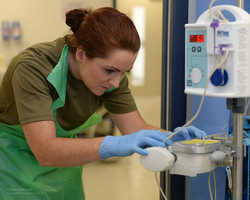Online Schools
Campus Schools

College Majors
- Alternative Medicine/Healing Arts
- Dental Assistant
- Dental Office Management
- Exercise Science & Health
- Health Information Management
- Health Information Technologies (HIT)
- Healthcare
- Healthcare Aide'
- Healthcare Online
- Healthcare Training
- Herbalist Studies
- Herbology
- Iridology Studies
- Lifecare Planning
- Medical Office Administration
- Naturopathy Medicine
- Nursing Management
- Nutrition
- Practical Nursing
- Respiratory Therapy
College Search
- 50 States
- » Colleges & Universities
- » Majors
- » Health & Medical / Nursing
Health Information Technologies Degree Programs
Health Information Technologies (HIT) Programs: The Key to a Medical Records Career
What Does the Field of Health Information Technology Cover?
For every person who has ever seen a doctor, been admitted to a hospital, or had any sort of medical treatment, there is an extensive medical record. Your medical record is an extensive file of compiled information. Consider the forms that you fill out when attending a new medical clinic. This forms the basis of your medical record with that facility. Commonly, when you change medical care facilities, your previous medical records are requested forwarded to the new location where they are evaluated and summarized and become part of the new file. From that point, every visit you have with a doctor, every relevant phone conversation, every prescription, every test, and each batch of results is added. A health information technologist is someone who keeps an eye on all of these patient records.
Health Information Technologies Degree Programs
What Training Do Health Information Technology Provide?
Most health information technologists enter the work force with a minimum of an associate's degree from a community or junior college. These degrees generally take 2 years of study to complete. Coursework includes medical law as it pertains to medical recordkeeping, anatomy, physiology, database management, statistic, medical terminology, statistics, and coding.
What are Job Conditions and Outlook like for Health Information Technologists?
As a health information technologist you would work in hospitals, nursing facilities, treatment centers, and medical clinics. The work is generally 40 hours per week, with over time and shifts to be expected if employment is with a 24 hour care facility such as a hospital or nursing home. The future looks good for the health information technology field as medical technology advances. New treatments and tests mean more treatments and tests hence more extensive medical records. To keep up with this increase, medical clinics will depend more on health information technicians to ensure that medical records are complete and compiled efficiently.
Sources: Occupational Outlook Handbook





